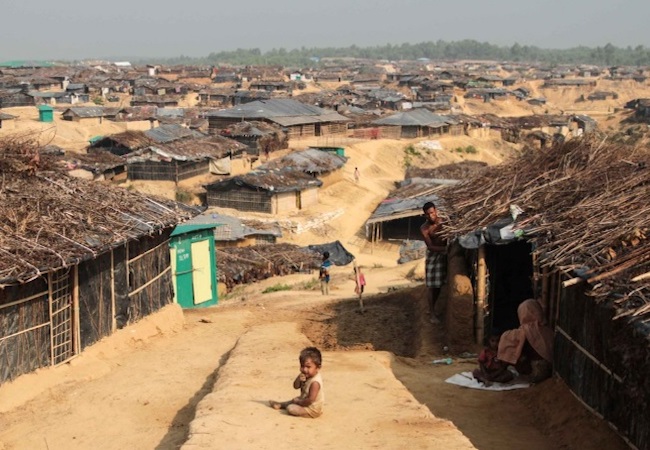The Rohingya have a right to return to Myanmar

By Tahseen Ali
Since August 2017 Bangladesh has been dealing with a catastrophic humanitarian crisis generated solely by Myanmar’s brutal military oppression of the Rohingya people. Myanmar has been condemned almost universally and its actions have been categorized as ethnic cleansing or worse, genocide.
As a result of these atrocities more than 650,000 Rohingya have taken shelter in Bangladesh. This is in addition to the 300,000 Rohingya that had already fled to Bangladesh during previous attacks by their own government in 1978 and 1991.
The Rohingya Muslims have lived in present-day Myanmar for a millennium, from the time that a Buddhist Rakhine kingdom had existed separately from Myanmar. The Rohingya are descendants of Muslim traders from as far as Persia who peacefully settled in the region and then commingled with the local Buddhist population over time, living in relative harmony. In the mid-20th century, after the departure of the British Empire, Rohingya participated in the civil life and governance of the country – contributing members of parliament, even ministers – as befitted the secular vision of the post-British government of Myanmar. This hope for a secular pluralist entity ended with the establishment of military rule in 1962.
In the following two decades the Rohingya were systematically stripped of their rights and eventually of their ethnic identity and right to exist within Myanmar and made essentially stateless, to the extent of being denied the bare modicum of human dignity. This is a precarious, vulnerable and ominous condition, which German intellectual Hannah Arendt, herself a victim of Nazi oppression, described thusly: “It seems that a man who is nothing but a man has lost the very qualities which make it possible for other people to treat him as a fellow-man.” The objective of the military regime subjecting the Rohingya to such brutality had but one goal; to create a purely Buddhist nation-state, which, given Myanmar’s complex multi-ethnic, multi-religious past, is a manifestly ahistorical undertaking.
Bangladesh, a country of 160 million, with its own problems and challenges, nevertheless took on this additional burden under the leadership of its Prime Minister Sheikh Hasina. Bangladesh has given shelter and refuge to the Rohingya who have arrived since August of last year, expanding camps, building shelters, vaccinating children, providing medical care and doing everything it can to look after them. The Bangladeshi people and their government have welcomed these victims of persecution with all the resources at their disposal, and at great cost; structurally and ecologically. At the same time Sheikh Hasina’s government has engaged in diplomacy with Myanmar to negotiate the safe return of the displaced Rohingya in stages over the next two years, and those talks are ongoing.
Myanmar is the Rohingya homeland and it is their right to return under safe conditions. That’s why it’s surprising to see sentiment from some quarters criticizing Bangladesh for negotiating their return and urging Dhaka to grant refugee status or citizenship to all the Rohingya.
The premise is a logistical and mechanical impossibility. Bangladesh does not have the resources to instantly and permanently absorb 1 million new residents. Additionally, because few have historically sought to relocate to Bangladesh, it does not have an immigration system set up to accept migrants. Bangladesh citizenship is achieved only by marriage or having one parent who is Bangladeshi.
One scholar who ought to know all this is Pakistani-British author Azeem Ibrahim, who has written extensively about the Rohingya. That’s why it was shocking to see his December article in the Dhaka Tribune dismiss attempts to repatriate the Rohingya, who must resign themselves to “be a permanent part of Bangladesh,” as he wrote.
Ibrahim has used the term “genocide” to describe the treatment of the Rohingya at a time when others had shirked from it. Is this how one treats the victims of genocide, then? Telling them to accept their fate and predicament?
The proposal would be nothing short of destabilizing for Bangladesh. The weaponization of helpless refugees plays into the hands of unsavoury actors at both the individual and state level. To give credence to the ideas that displaced peoples must simply accept their lot amounts to an invitation to other countries to expel unwanted populations with impunity.
It may be no coincidence that Ibrahim identifies as an adviser to Pakistani right-wing Islamist politician Imran Khan, who opposed Bangladesh’s war crimes trials meant to bring justice for the victims of Pakistan’s 1971 genocide in Bangladesh. A destabilized Bangladesh would be a welcome development to Pakistan, which remains a foe of Bangladesh.
Ibrahim should remember that despite the Nazis’ attempt to destroy the Jewish people, it failed, and they returned to their homeland. The Rohingya too, will return to their homeland. It is their birth right.
Tahseen Ali hold a PhD specializing in South Asian and British imperial history.




